All Souls College, Oxford
| All Souls College | |
|---|---|
| Oxford | |
 | |
 Blazon: Or, a chevron between three cinquefoils gules. | |
| Location | High Street, Oxford |
| Coordinates | 51°45′12″N 1°15′11″W / 51.753279°N 1.253041°W / 51.753279; -1.253041Coordinates: 51°45′12″N 1°15′11″W / 51.753279°N 1.253041°W / 51.753279; -1.253041 |
| Full name | College of the souls of all the faithful departed |
| Latin name | Collegium Omnium Animarum |
| Established | 1438 |
| Named for | Feast of All Souls |
| Sister college | Trinity Hall, Cambridge |
| Warden | John Vickers |
| Undergraduates | None |
| Postgraduates | 8 (2017)[1] |
| Website | www.asc.ox.ac.uk |
| Map | |
 Location in Oxford city centre | |
All Souls College (official name: College of the souls of all the faithful departed[2]) is a constituent college of the University of Oxford in England.
Unique to All Souls, all of its members automatically become fellows (i.e. full members of the College's governing body). It has no undergraduate members, but each year recent graduate and postgraduate students at Oxford are eligible to apply for examination fellowships through a competitive examination (once described as "the hardest exam in the world") and, for the several shortlisted after the examinations, an interview.[3][4][5]
All Souls is one of the wealthiest colleges in Oxford, with a financial endowment of £286.4 million (2014).[6] However, since the college's principal source of revenue is its endowment, it only ranks 19th among Oxford colleges in total income.[7] All Souls is a registered charity under English law.[8]
The college is located on the north side of the High Street adjoining Radcliffe Square to the west. To the east is The Queen's College with Hertford College to the north.
The current warden (head of the college) is Sir John Vickers, a graduate of Oriel College, Oxford.
Contents
1 History
2 Buildings and architecture
2.1 Codrington Library
2.2 Chapel
3 Fellowships
3.1 Examination Fellowships
3.1.1 Notable candidates
3.1.1.1 Successful
3.1.1.2 Unsuccessful
3.1.2 Subjects of the "Essay"
3.2 Other fellowships
3.3 Chichele Professorships
3.4 Chichele Lectures
4 Customs
5 Fellows
6 Gallery
7 References
8 External links
History
The College was founded by Henry VI of England and Henry Chichele (fellow of New College and Archbishop of Canterbury), in 1438. The Statutes provided for a warden and forty fellows; all to take Holy Orders: 24 to study arts, philosophy and theology; and 16 to study civil or canon law. The College's Codrington Library, was completed in 1751 through the bequest in 1710 of Christopher Codrington, a wealthy plantation owner from Barbados, who attended Oxford and later became colonial governor of the Leeward Islands.
Today the College is primarily a graduate research institution. It now has no undergraduate members. All Souls did once have them, especially in the early 17th century at the instigation of Robert Hovenden (Warden of the college from 1571 to 1614), in order to provide the fellows with servientes (household servants). The admission of undergraduates for this purpose was abandoned in the 19th century, although four Bible Clerks remained on the foundation until 1924.[9]
For over five hundred years All Soul's College admitted only men; women were first allowed to join the college as fellows in 1979,[10] the same year as many other previously all-male colleges in the university.[11]
Buildings and architecture
Codrington Library
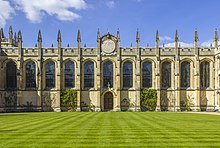
Codrington Library
The All Souls Library (formally known as the Codrington Library) was founded through a bequest from Christopher Codrington (1668–1710), a Fellow of the College. Christopher Codrington bequeathed books worth £6,000, in addition to £10,000 in currency. This bequest allowed the library to be built and endowed. Christopher Codrington was born in Barbados, and amassed his fortune from his sugar plantation in the West Indies.[12] The library was completed in 1751, and has been in continuous use since then. The modern library comprises some 185,000 items, about a third of which were published before 1800. The collections are particularly strong in law and history (especially military history).[13]
Chapel
Built between 1438 and 1442, the chapel remained largely unchanged until the Commonwealth. Oxford, having been a largely Royalist stronghold, suffered under the Puritans' wrath. The 42 misericords date from the Chapel's building, and show a resemblance to the misericords at Higham Ferrers. Both may have been carved by Richard Tyllock.
Christopher Wren was a fellow from 1653, and in 1658 produced a sundial for the College. This was originally placed on the south wall of the Chapel, until it was moved to the quadrangle (above the central entrance to the Codrington Library) in 1877. During the 1660s a screen was installed in the Chapel, which was based on a design by Wren. However, this screen needed to be rebuilt by 1713. By the mid-19th century the Chapel was in great need of renovation, and so the current structure is heavily influenced by Victorian design ideals.
All services at the chapel are according to the Book of Common Prayer; the King James Bible is also used rather than more modern translations.[14]
Fellowships
Examination Fellowships
In the three years following the award of their bachelor's degrees, students graduating from Oxford and current Oxford postgraduate students having graduated elsewhere[15] are eligible to apply for examination fellowships (sometimes informally referred to as "Prize Fellowships") of seven years each. While tutors may advise their students to sit for the All Souls examination fellowship, the examination is open to anybody who fulfils the eligibility criteria and the College does not issue invitations to candidates to sit.[16] Every year in early March, the College hosts an Open Evening for Women, offering women interested in the Examination Fellowship an opportunity to find out more about the exam process and to meet members of the College.[17]
Each year several dozen candidates typically sit the examination.[4][18] Two examination fellows are usually elected each year, although the college has awarded a single place or three places in some years, and on rare occasions made no award.[19]
The competition, offered since 1878[20] and open to women since 1979,[4] is held over two days in late September, with two papers of three hours each per day. It has been described in the past as "the hardest exam in the world".
Two papers (the 'specialist papers') are on a single subject of the candidate's choice; the options are classics, English literature, economics, history, law, philosophy, and politics. Candidates may sit their two specialist papers in different specialist subjects, provided each paper is in one subject only (for example, a candidate might sit one paper in History and one paper in Politics). Candidates who choose Classics have an additional translation examination on a third day.[15]
Two papers (the 'general papers') are on general subjects. For each general examination, candidates choose three questions from a list.[21] Past questions have included:
- "'If a man could say nothing against a character but what he could prove, history could not be written' (Samuel Johnson). Discuss."[22]
- "Should the Orange Prize for Fiction be open to both men and women?"[21]
- "Does the moral character of an orgy change when the participants wear Nazi uniforms?"[20]
Before 2010 candidates also faced another examination, a free-form "Essay" on a single, pre-selected word.[3][4][20]
Four to six[18] finalists are invited to a viva voce[19] or oral examination.[15] Previously, these candidates were then invited to dinner with about 75 members of the college. The dinner did not form part of the assessment, but was intended as a reward for those candidates who had reached the latter stages of the selection process. However, the dinner has been discontinued as the college felt candidates worried too often that it was part of the assessment process.
About a dozen examination fellows are at the college at any one time.[4] There are no compulsory teaching or requirements, although examination fellows must pursue a course of study or research at some point within their first two years of fellowship. They can study anything for free at Oxford with room and board.[15] As "Londoners" they can pursue approved non-academic careers[4][15] if desired, with a reduced stipend, as long as they pursue academia on a part-time basis and attend weekend dinners at the college during their first academic year.[18] As of 2011[update] each Examination Fellow receives a stipend of £14,842[23] annually for the first two years; the stipend then varies depending on whether the Fellow pursues an academic career.[15]
Notable candidates
Until 1979, women were not permitted to put themselves forward for fellowships at All Souls.[10]
Successful
Leo Amery (1897),[24] politician
Isaiah Berlin (1932),[22] philosopher
George Earle Buckle (1877),[24] journalist
Lord Curzon (1883),[22][24]Viceroy of India
Geoffrey Dawson (1898),[24] journalist
Matthew d'Ancona (1989),[22] journalist
John Gardner (1986),[25] legal philosopher
Birke Häcker (2001), legal scholar[26]
Quintin Hogg,[27] politician and philosopher
Douglas Jay (1930),[28] politician
Keith Joseph,[5] politician
Cosmo Gordon Lang (1888),[24]Archbishop of Canterbury
Jeremy Morse,[22] banker
Lord Pannick (1978),[29] barrister
Derek Parfit (1974),[30] philosopher
John Redwood (1972),[22] politician
A. L. Rowse (1925),[22] historian and poet
Katherine Rundell (2008),[31] author
Lord Chancellor Simon (1897),[24] politician
William Waldegrave (1971),[22] politician
Richard Wilberforce,[3] jurist
Bernard Williams (1951),[32] philosopher
T. E. Lawrence CB DSO FAS
Sir John Vickers (1979), economist
Unsuccessful
Hilaire Belloc (1895),[22] author
John Buchan (1899),[22][33] author and Governor General of Canada
Lord David Cecil,[22] author
H. L. A. Hart (1929, 1930),[28] philosopher
William Holdsworth (1897),[24] legal historian
Harry Mount (1994),[4] journalist
Ramsay Muir (1897),[24] politician
Alfred Denning (1923),[34] jurist
Hugh Trevor-Roper,[22] historian
Harold Wilson,[35]Prime Minister of the United Kingdom
Lord Bingham, jurist
Subjects of the "Essay"
- "bias"[3][4]
- "censorship"[20]
- "chaos"[4][20][22]
- "charity"[20]
- "comedy"[36]
- "conversion" (1979)[20][37]
- "corruption"[20]
- "culture" (1914)[37]
- "diversity" (2001)
- "error" (1993)[4]
- "harmony" (2007)[20][21]
- "innocence" (1964)[3][4][20]
- "integrity" (2004)[18]
- "mercy"[4][20][22]
- "miracles" (1994)[3][22]
- "morality"[4]
- "novelty" (2008)[3][4][20][21]
- "originality"[37]
- "possessions" (1925)[22]
- "reproduction" (2009)[20][21][37]
- "style" (2005)[4][20][21]
- "water" (2006)[3][4][21]
Other fellowships
Other categories of fellowship include:
- Senior research fellows (a renewable seven year appointment)
- Extraordinary research fellows (elected to conduct research into the College's history)
- Visiting fellows (academics from other universities, usually elected for a period of one term to one year)
- Post-Doctoral research fellows (a non-renewable five year post open to those who have recently completed doctoral study at a recognised university)
- Fifty-Pound fellows (open only to former Fellows no longer holding posts in Oxford)
- Official fellows (consisting of holders of College posts, such as the Domestic Bursar, Estates Bursar, Chaplain, and Fellow Librarian)
- Distinguished fellows
There are also a number of professorial fellows who hold their fellowships by virtue of their University post.
Chichele Professorships
Fellows of the College include the Chichele Professors, who hold statutory professorships at the University of Oxford named in honour of Henry Chichele (also spelt Chicheley or Checheley, although the spelling of the academic position is consistently "Chichele"), an Archbishop of Canterbury and founder of All Souls College, Oxford. Fellowship of that College has accompanied the award of a Chichele chair since 1870.
Following the work of the 1850 Commission to examine the organisation of the University, All Souls College suppressed ten of its fellowships to create the funds to establish the first two Chichele professorships: The Chichele Professor of International Law and Diplomacy, established in 1859 and first held by Mountague Bernard, and the Chichele Professor of Modern History, first held by Montagu Burrows.
There are currently Chichele Professorships in five different subjects:
Chichele Professor of Economic History: Kevin O'Rourke.
Chichele Professor of the History of War: Hew Strachan appointed 1 January 2002.
Chichele Professor of Public International Law: Vaughan Lowe appointed 1 October 1999.
Chichele Professor of Social and Political Theory: Jeremy Waldron appointed December 2009.
Chichele Professor of Medieval History: Julia M.H. Smith, appointed September 2016
Probably the best known former Chichele Professor is Sir Isaiah Berlin. Perhaps the best known former Professor of the History of War was Cyril Falls.
Chichele Lectures
The Chichele Lectures are a prestigious series of lectures formally established in 1912 and sponsored by All Souls College. The lectures were initially restricted to foreign history, but have since been expanded to include law, political theory, economic theory, as well as foreign and British history. Traditionally the lectures were delivered by a single speaker, but it is now common for several speakers to deliver lectures on a common theme.[38]
Customs
Every hundred years, and generally on 14 January, there is a commemorative feast after which the fellows parade around the College with flaming torches, singing the Mallard Song and led by a "Lord Mallard" who is carried in a chair, in search of a legendary mallard that supposedly flew out of the foundations of the college when it was being built.[39] During the hunt the Lord Mallard is preceded by a man bearing a pole to which a mallard is tied – originally a live bird, latterly either dead (1901) or carved from wood (2001). The last mallard ceremony was in 2001[40] and the next is due in 2101. The precise origin of the custom is not known, but it dates from at least 1632.[41]
Fellows
Past and current fellows of the College have included:
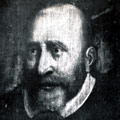
Robert Recorde – inventor of the Western "equals sign" (=).

Brownloe North – Bishop of Lichfield in 1771, Bishop of Worcester in 1774, and Bishop of Winchester in 1781.
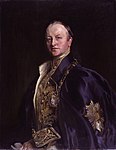
George Nathaniel Curzon by John Cooke – British Conservative statesman who was Viceroy of India and Foreign Secretary.
- Leo Amery
- William Reynell Anson
- Andrew Ashworth
- F. W. Bain
- Max Beloff
- Isaiah Berlin
- Margaret Bent
- Tim Besley
- Peter Birks
- Susanne Bobzien
- William Blackstone
- Malcolm Bowie
- Peter Brown
- Julian Bullard
- Myles Burnyeat
- Lionel Butler
- Raymond Carr
- David Caute
- Alasdair Clayre
- Christopher Codrington
- Gerald Cohen
- Peter Conrad
- George Nathaniel Curzon
- Matthew d'Ancona
- David Daube
- David Dilks
- Michael Dummett
- Edward Evan Evans-Pritchard
- Cécile Fabre
- Sheppard Frere
- John Gardner
- Robert Gascoyne-Cecil, 3rd Marquess of Salisbury
- Robert Gentilis
- Gabriel Gorodetsky
- Birke Häcker
- Ruth Harris
- Andrew Harvey
- Reginald Heber
- Hensley Henson
- Cecilia Heyes
- Rosemary Hill
- Quintin Hogg, Baron Hailsham of St Marylebone
- Christopher Hood
- John Hood (university administrator)
- Michael Howard
- Susan Hurley
- E. F. Jacob
- Keith Joseph
- Colin Kidd
- Leszek Kołakowski
- Cosmo Gordon Lang
- T. E. Lawrence
- Edward Chandos Leigh
- Thomas Linacre
- Vaughan Lowe
- Stephen Lushington
- Robert Gwyn Macfarlane
- James Rochfort Maguire
- Noel Malcolm
- John Mason
- Angela McLean
- Catherine Morgan
- Edward Mortimer
- Max Müller
- Patrick Neill, Baron Neill of Bladen
- Brownlow North
- Avner Offer
- David Pannick
- Derek Parfit
- Anthony Quinton
- Sarvepalli Radhakrishnan
- Robert Recorde
- Catherine Redgwell
- John Redwood
- A. L. Rowse
- Katherine Rundell
- Peter Salway
- Andrew Scott (economist)
- Graeme Segal
- Amartya Sen
- Catriona Seth
- Patrick Shaw-Stewart
- Gilbert Sheldon
- John Simon, 1st Viscount Simon
- Boudewijn Sirks
- Margareta Steinby
- Alfred C. Stepan
- Joseph E. Stiglitz
- Charles Taylor
- Adam Thirlwell
- Guenter Treitel
- Cecilia Trifogli
- John Vickers
- William Waldegrave, Baron Waldegrave of North Hill
- Kate Warner
- Marina Warner
- Martin Litchfield West
- Charles Algernon Whitmore
- Richard Wilberforce
- Bernard Williams
- E. F. L. Wood, 1st Earl of Halifax
- Llewellyn Woodward
- Patrick Wormald
- Christopher Wren
- Crispin Wright
- Edward Young
- R. C. Zaehner
- Lucia Zedner
- William Emmanuel Abraham
Gallery

The gates on Radcliffe Square

A view of All Souls College quadrangle from the Radcliffe Square gate

The south eastern corner of All Souls College, abutting Radcliffe Square

All Souls Quad abutting High Street

All Souls College as viewed from New College Lane
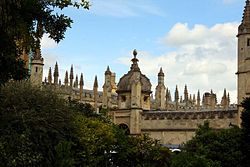
The spires of All Souls
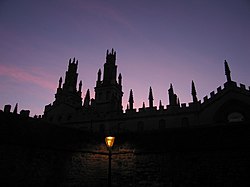
All Souls College at twilight

View from St Mary the Virgin's tower (with All Souls on the right)

All Souls College Chapel

All Souls College
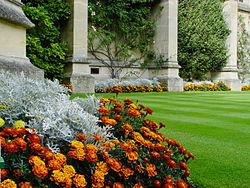
All Souls College
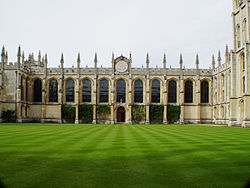
All Souls College
References
^ "Student statistics". University of Oxford. 2017. Retrieved 31 August 2018..mw-parser-output cite.citationfont-style:inherit.mw-parser-output .citation qquotes:"""""""'""'".mw-parser-output .citation .cs1-lock-free abackground:url("//upload.wikimedia.org/wikipedia/commons/thumb/6/65/Lock-green.svg/9px-Lock-green.svg.png")no-repeat;background-position:right .1em center.mw-parser-output .citation .cs1-lock-limited a,.mw-parser-output .citation .cs1-lock-registration abackground:url("//upload.wikimedia.org/wikipedia/commons/thumb/d/d6/Lock-gray-alt-2.svg/9px-Lock-gray-alt-2.svg.png")no-repeat;background-position:right .1em center.mw-parser-output .citation .cs1-lock-subscription abackground:url("//upload.wikimedia.org/wikipedia/commons/thumb/a/aa/Lock-red-alt-2.svg/9px-Lock-red-alt-2.svg.png")no-repeat;background-position:right .1em center.mw-parser-output .cs1-subscription,.mw-parser-output .cs1-registrationcolor:#555.mw-parser-output .cs1-subscription span,.mw-parser-output .cs1-registration spanborder-bottom:1px dotted;cursor:help.mw-parser-output .cs1-ws-icon abackground:url("//upload.wikimedia.org/wikipedia/commons/thumb/4/4c/Wikisource-logo.svg/12px-Wikisource-logo.svg.png")no-repeat;background-position:right .1em center.mw-parser-output code.cs1-codecolor:inherit;background:inherit;border:inherit;padding:inherit.mw-parser-output .cs1-hidden-errordisplay:none;font-size:100%.mw-parser-output .cs1-visible-errorfont-size:100%.mw-parser-output .cs1-maintdisplay:none;color:#33aa33;margin-left:0.3em.mw-parser-output .cs1-subscription,.mw-parser-output .cs1-registration,.mw-parser-output .cs1-formatfont-size:95%.mw-parser-output .cs1-kern-left,.mw-parser-output .cs1-kern-wl-leftpadding-left:0.2em.mw-parser-output .cs1-kern-right,.mw-parser-output .cs1-kern-wl-rightpadding-right:0.2em
^ "History of the College". All Souls College, University of Oxford.
^ abcdefgh Shepherd, Jessica. "The word on Oxford University's All Souls fellows exam is: axed" The Guardian, 14 May 2010.
^ abcdefghijklmnop Mount, Harry. "All Souls, Oxford should continue to put genius to the test" The Daily Telegraph, 19 May 2010.
^ ab "Is the All Souls College entrance exam easy now?", The Guardian, 17 May 2010.
^ "All Souls College: Annual Report and Financial Statements for the year ended 31 July 2014", page 34.
^ Finance, All Souls College, Oxford. Archived 30 May 2009 at the Wayback Machine
^ Charity Commission. THE COLLEGE OF ALL SOULS OF THE FAITHFUL DEPARTED, OF OXFORD, registered charity no. 1138057.
^ History page 3 Archived 4 June 2008 at the Wayback Machine, All Souls College, Oxford (accessed 11 March 2008).
^ ab "All Souls College Oxford". www.asc.ox.ac.uk. Retrieved 2018-05-04.
^ "Women at Oxford | University of Oxford". www.ox.ac.uk. Retrieved 2018-05-04.
^ James Walvin, Slavery and the Building of Britain, BBC.
^ "Codrington Library". www.all-souls.ac.uk.
^ "The Chapel". All Souls College. University of Oxford. Retrieved 31 August 2017.
^ abcdef "Examination Fellowships 2010 Archived 3 August 2010 at the Wayback Machine" All Souls College, Oxford
^ https://www.asc.ox.ac.uk/examination-fellowships-general-information
^ "All Souls College news: Open Evening for Women".
^ abcd Wainwright, Tom. "The most glittering prize" The Daily Telegraph, 8 January 2005.
^ ab "The Soul of All Souls" TIME, 19 May 1961.
^ abcdefghijklmn Lyall, Sarah. "Oxford Tradition Comes to This: ‘Death’ (Expound)" The New York Times, 27 May 2010.
^ abcdefg "Sample Fellowship Exam, Oxford University's All Souls College" The New York Times, 27 May 2010.
^ abcdefghijklmnop Mount, Harry. "A few things pointy-heads should know" New Statesman, 4 October 1999. Archived 18 July 2010 at the Wayback Machine
^ "Archived copy". Archived from the original on 29 December 2011. Retrieved 7 January 2012.CS1 maint: Archived copy as title (link)
^ abcdefgh "Sir William Anson Archived 18 June 2010 at the Wayback Machine"
^ "John Gardner at Home". users.ox.ac.uk. Retrieved 2016-03-03.
^ Gordon, Olivia. "Professor Birke Häcker: Interviewed". Brasenose College. University of Oxford. Retrieved 8 October 2017.
^ "B: Appeasement and public opinion". The Churchill Era. Churchill College, Cambridge. Retrieved 21 May 2012.
^ ab Lacey, Nicola (2006). A life of H.L.A. Hart: the nightmare and the noble dream. Oxford University Press. pp. 41, 43. ISBN 0-19-920277-X.
^ "Lord Pannick QC - Blackstone Chambers". www.blackstonechambers.com. Archived from the original on 21 March 2016. Retrieved 2016-03-16.
^ "Derek Parfit". All Souls College. Retrieved 30 July 2014.
^ "Katherine Rundell".
^ "Bernard Williams (Stanford Encyclopedia of Philosophy)". Plato.stanford.edu. Retrieved 23 April 2013.
^ Godine, David R. and Andrew Lownie. John Buchan: the Presbyterian cavalier (1995), pp. 60–61.
^ "Lord Denning, OM". The Daily Telegraph. London. 6 March 1999.
^ Pimlott, Ben (1992). Harold Wilson. HarperCollins. p. 61. ISBN 0002151898.
^ Hensher, Philip. "'Comedy' was the word for my exam" The Independent, 24 May 2010.
^ abcd Little, Reg. "One-word exam ending" The Oxford Times, 20 May 2010.
^ Howard Colvin and J.S.C. Simmons, All Souls: An Oxford College and its Buildings (Oxford: OUP, 1989), p. 91.
^ "Hunting the Mallard, Oxfordshire". British Folk Customs.
^ Daily Telegraph 15 January 2001: https://www.telegraph.co.uk/news/uknews/1314859/Mallard-leads-Oxford-fellows-a-merry-dance.html
^ HOLE, Christina, English Custom and Usage, London, Batsford, 1941, p.28: "...we know that the custom existed at least as early as 1632, for in that year Archbishop Abbot censured the College for a riot "in pretence of a foolish Mallard". "Mallard" has since become a colloquialism at the college, generally meaning "rubbish".
External links
| Wikimedia Commons has media related to All Souls College, Oxford. |
Wikisource has original text related to this article: All Souls College, as described in "Literary Landmarks of Oxford". |
- Official website
- Current Examination Fellows
- Virtual Tour of All Souls College












